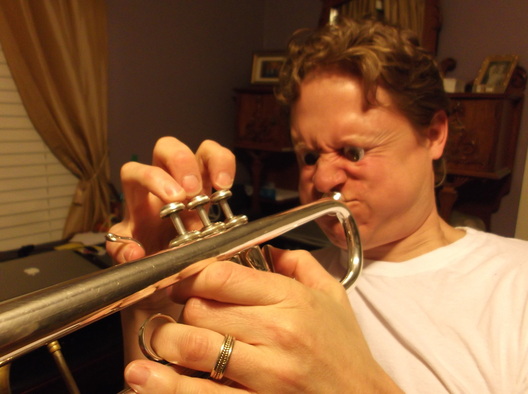Here is a very simple but effective idea to make me, and you better regardless of our instrument, or activity. Well, it can't really promise that, but it may at least slow the degradation. Ha! Sometimes that is too true.
Here is a list of the trumpet faults that I see in my own playing over and over. I got tired of not being able to figure out what was going wrong in my playing fast enough when trying to warm up, or whenever problems arose.
Gordon’s Usual Trumpet Faults
1. Self-Focus In Playing
2. Bottom Jaw Sinks In
3. Corners Disengage
4. Breathing Too Shallow (At Times Overly Deep)
5. Air is not supported
6. Too Much Mouthpiece Pressure
7. Restricted Orbicularis Oris inside and Underneath Mouthpiece
8. Lack of Energy or life in Playing – Pounding Notes
That list is great for diagnosing my problems, although it may or may not hit yours. Make your own fault list.
Now this next list I made using the last. I turned each entry into a positive that I can focus on in my playing during my warm-up, or whenever, to make sure that I'm getting the most out of my time.
Gordon’s Trumpet Focus Points
1. Direct Playing Toward God
2. Keep Jaw Comfortably Forward
3. Engage Corner s Forward
4. Breath Full Without Strain
5. Waste Air
6. Keep Mouthpiece Light
7. Let Orbicularis Oris be Netrual in Feel Within and Under Mouthpiece
8. Play with Life and Energy
Make your own list of things to focus on.
Of top importance is to know why you play; otherwise, why play? That is why I put,"Direct Playing Toward God" first.
Here is a list of the trumpet faults that I see in my own playing over and over. I got tired of not being able to figure out what was going wrong in my playing fast enough when trying to warm up, or whenever problems arose.
Gordon’s Usual Trumpet Faults
1. Self-Focus In Playing
2. Bottom Jaw Sinks In
3. Corners Disengage
4. Breathing Too Shallow (At Times Overly Deep)
5. Air is not supported
6. Too Much Mouthpiece Pressure
7. Restricted Orbicularis Oris inside and Underneath Mouthpiece
8. Lack of Energy or life in Playing – Pounding Notes
That list is great for diagnosing my problems, although it may or may not hit yours. Make your own fault list.
Now this next list I made using the last. I turned each entry into a positive that I can focus on in my playing during my warm-up, or whenever, to make sure that I'm getting the most out of my time.
Gordon’s Trumpet Focus Points
1. Direct Playing Toward God
2. Keep Jaw Comfortably Forward
3. Engage Corner s Forward
4. Breath Full Without Strain
5. Waste Air
6. Keep Mouthpiece Light
7. Let Orbicularis Oris be Netrual in Feel Within and Under Mouthpiece
8. Play with Life and Energy
Make your own list of things to focus on.
Of top importance is to know why you play; otherwise, why play? That is why I put,"Direct Playing Toward God" first.

 RSS Feed
RSS Feed
